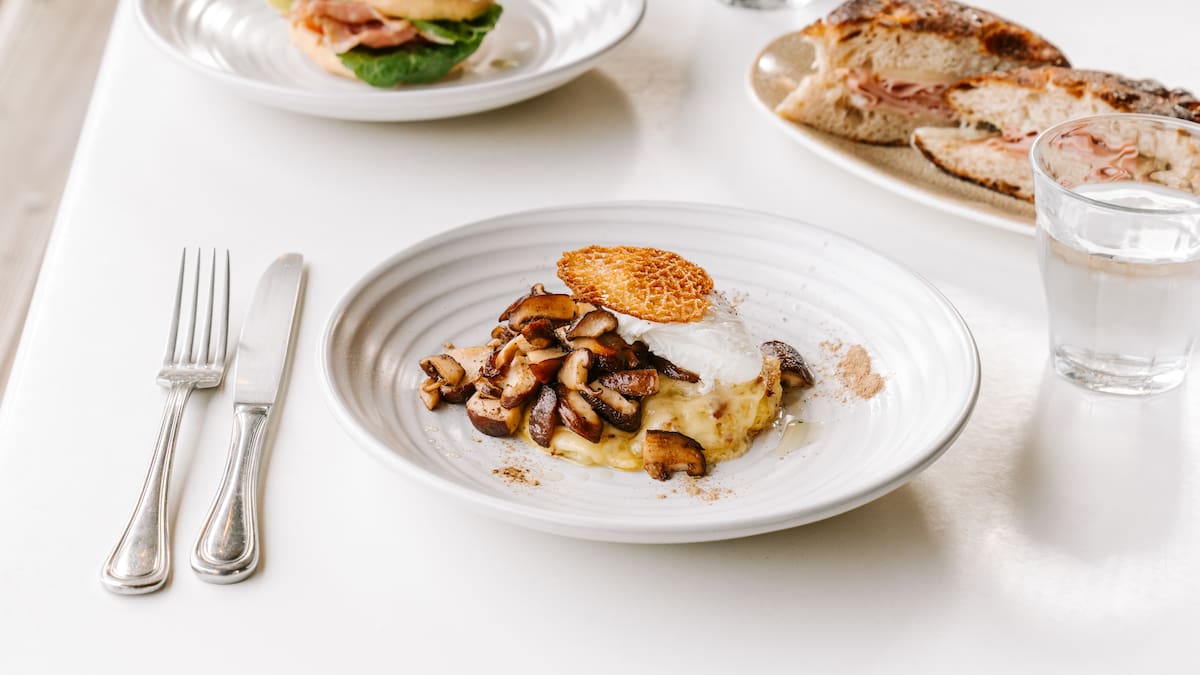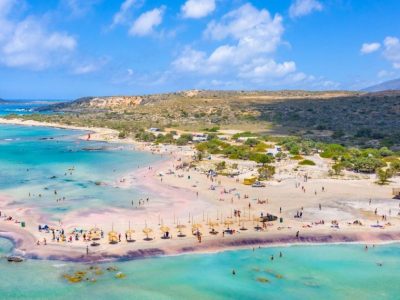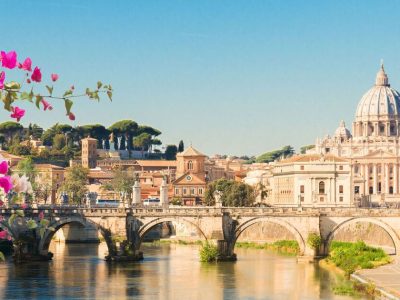The next stop is Whangamatā, where I have heard about a new restaurant opening in the old pink cinema, which I remember going to as a child. Before it was a cinema, it was a dance hall. Now it has been reimagined yet again as a Spanish restaurant. At the core of the restaurant space and the menu is fire. Camina’s dining room is small and dimly lit. The seats around the bar have a front-row view, but no matter where you are, your eyes are drawn to the flames in the open kitchen.

Camina is the vision of two friends, Barend and Rowan. Barend is the chef, his attention devoted to the fire and everything rotating in and out of it. Rowan is the host, all warm smiles and energy. The menu celebrates local and sustainable ingredients, with produce from organic Pakaraka Permaculture and wine from vineyards such as Deep Down, which creates small-batch, wild-fermented vintages. On the dessert menu is mousse made from Coromandel Chocolate, which has a shop down the road. The promise of flame-cooked meals means a lot of meat, so most of the charred menu is off-limits to me. But, Rowan assures me that one of the most popular dishes is the cabbage, grilled to perfection with subtly sweet tomato jam and labneh. It’s delicious. Rowan never stops moving, crisscrossing the room with plates of food and drink, but somehow he still manages to chat to me – and, I suspect, to almost everyone else there. He’s always smiling, even as he tells me about how busy they’ve been ever since opening their doors at the end of 2023. I’m not surprised. Fittingly for the name, which means “walk” in Spanish, it’s a place worth travelling to.

The following morning, I pause for coffee at Port Road Project, Barend’s other local hospitality venture. I spot him bustling around there too, apparently never stopping in his mission to bring good food and vibes to Whangamatā.
My road trip research takes me from the Coromandel along the coast to the lush Bay of Plenty, where I start to see more roadside fruit and vegetable stalls overflowing with avocados. My plan for lunch is Picnicka, in the centre of Tauranga. Picnicka is the latest concept of Kiwi-Italian couple Kim and Noel Cimadom, and like their other restaurants – Clarence Bistro and Alpino in the Mount – echoes the charm of European living. The restaurant is on the second floor of a shopping centre, which belies how beautiful the vast, light-filled space is.
The decor is rustic and takes the picnic theme to heart, with lots of wicker, checked fabric, and baskets of dried flowers. The menu is simple, focused on quality ingredients, and designed for sharing. That presents a problem for me. A challenge as a solo diner in the era of shared plates is ordering enough to sample a diverse menu without ordering too much for one person. I go way overboard and order far too much food. Nevertheless, I feel no shame as I tuck into house-made barbecued flatbread with whipped feta, luscious buffalo cauliflower with blue cheese sauce, and heirloom tomatoes with garlic yoghurt and fresh basil.

A few days later, and by then likely a few kilos heavier, I wake up to a sunrise further down the coast in Ōhope. After several days of eating, I don’t feel like a heavy breakfast, but coffee is on the cards. Volk and Co in Whakatāne, a specialty coffee bar with an earthy vibe, from forest-green coffee cups and a wood-accented interior, is the ideal place to start the day. The menu on the wall lists a range of different coffee preparations – filter, Vietnamese, cold brew, coconut iced coffee – but I order a flat white. And then throw in a dense chocolate brownie from the cabinet.
My final stop is yet another sweet surprise. Turning off the main highway back to Tauranga, I’m sceptical of finding a good lunch spot in sleepy Paengaroa, a small village in the midst of rolling green orchards. But lo and behold, there’s The Trading Post, a humble red weatherboard building on the corner of a quiet street. The sign promises an authentic Osteria Italiana. Through the front gates is a gorgeous little courtyard and a covered deck area, with enough vine-covered bricks and olive trees to make me feel transported somewhere much more Mediterranean. The dining room inside features the old fireplace, wooden floors, and rugs that add to the homely feel.

The restaurant is a family-owned affair, run by Piedmont native Simone Saglia and his Waikato-born wife, Kylie. The menu showcases specialties found in the different regions of Simone’s home country of Italy, but it’s shaped around seasonal, local produce. Like the bottoni, handmade button-shaped pasta stuffed with ricotta and Bay of Plenty truffles. Everything, from the focaccia to the pastries, is house-made with care. Obviously, I also order a dessert, because it doesn’t feel like a proper Italian lunch without one. Cracking the crunchy, caramelised sugar crust of the chocolate and mascarpone crema bruciata is a satisfying end to lunch.

Heading home, I’m happy to admit I was wrong about finding excellent places to eat in New Zealand’s smaller towns. The only real disappointment I experience on my Bay of Plenty food crawl is that Cigol, a Korean fusion restaurant in Whakatāne, is closed when I’m in town. Yet even that turns out to be a good thing – it gives me a great excuse to do the whole trip again.










